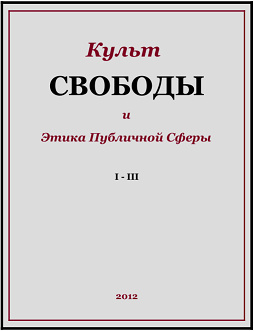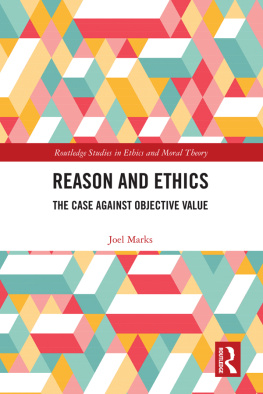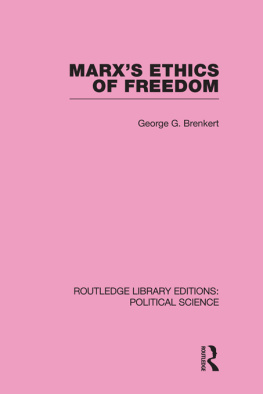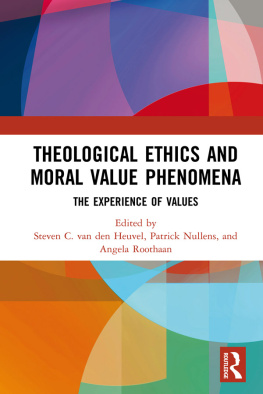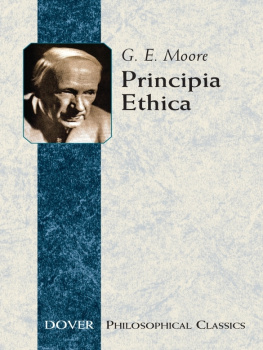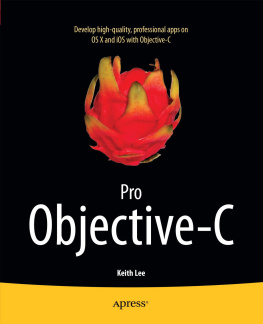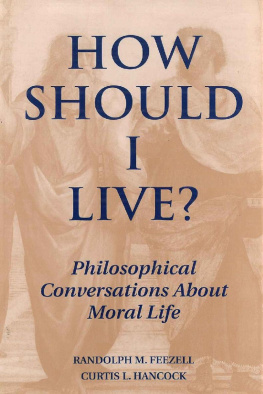Cult of Freedom
&
Ethics of Public Sphere
vol. I - II
Translated, abridged and adopted from
in 2013
Annotation / Abstract
This book outlines the author's concept of ethics ("objective ethics", OE), which refers to the purpose, meaning and principles of both the proper behavior of the intelligent being and the properly arranged society of any intelligent beings. The book shows the relation of objective ethics to freedom; describes how ethics have emerged in human history; explains why we need it. The book demonstrates why OE is the only true ethics. Its truth (and objectivity) stems from the fact that its source is in objective reality independent of any possible moral actor. Objective ethics is the basis of the public sphere of society, i.e. the basis for actions of and relations between any intelligent beings not connected personally. It has nothing to do with religion, traditions or science. The foundations of OE are purely metaphysical although its practical norms are found and formed through a trusted fair contract between free moral actors. However, OE is not based on the contract. Rather it is the contract that based on this ethics. Universal common ground for consensus, its goal and condition is freedom, and in order to achieve it OE demands the elimination of all forms of violence, coercion, oppression, influence and the like that may violate free expression of the will. Therefore OE leads (and has led earlier) humanity to a free and just society that is a moral alternative to the modern oppressive order. OE brings no practical benefits, goods or utility, and its ultimate goal is absolute (metaphysical) freedom even if it is unreachable. OE helps find the objective truth and distinguish the objectively good from the objectively bad in everyday life.
Here are the main theses of objective ethics.
1) Freedom is an objective property of the universe opposite to determinism; it is responsible for the development of the universe (evolution) and at the same time is the aim of this development. Determinism is repeatability, regularity, certainty. It feels like a necessity, inevitability, compulsion, violence.
2) Freedom is fundamentally unknowable; the question of the existence of freedom is insolvable. Determinism is learned by observations and reflections. Determinism predetermines the future but freedom makes the future unpredictable and unknowable by denying determinism.
3) Freedom is perceived as Good and determinism as Evil. Freedom begets all other values. The duty of man, the purpose and meaning of human existence is to overcome determinism and to make the world freer. Cognition is part of this process. Knowledge entails responsibility; the criterion of truth is movement to freedom.
4) The man is one who follows his moral duty, who is striving to freedom. The motive of duty, the free will, is guided by the "feeling" of freedom. The unwillingness or inability of a sentient being to be a man brings it down to the level of animals. The animal follows the laws of the universe, submits to forces without trying to overcome them.
5) There is no absolute moral law; ethical norms are derived from the general contract. The basis, goal and condition of the consent is rejection of all forms of violence. The requirements of ethics cover conclusion of the contract (honesty, openness, objectivity) and compliance with it (fidelity to given word, adherence to rules, responsibility for violation).
6) Ethical norms (prohibitions) are formal; they are constantly improving; the old are replaced by new, more free and fair - this is the essence of moral progress. The meaning of the norms is to stimulate creative and constructive activities by limiting violence. The ethics treats people as abstractions; all private is ignored.
7) A special case of the contract is the exchange of man with society by the results of his activities. Ethics requires a fair (equivalent) retribution for both the harm and benefit brought by the man. Universal practical value units, money, express the value of freedom.
8) Personal relations are governed by a sacrificial morality (emotions, love, care, etc.), and catastrophic situations by a heroic morality. Both types of morality are informal, positive, limited in space and time, and require a clear separation from the public space (non-personal relations) governed by the ethics.
Table of Contents
I. Preliminaries
II. Essentials
Appendixes
I. Preliminaries
Is freedom natural?
Greetings, my friends!
Sorry for the long silence, but now that we are together again, I can share with you my thoughts on what I lack most. When a man is deprived of freedom, he is drawn to reflection. And insofar as we all reflect on freedom, we do not have it. And we just want to understand - what is it, what does it look like, where to get it?
1 The meaninglessness of determinism
To make an answer, we have to start from the beginning. Imagine that there is no us and there is only non-living matter. Is there freedom? No. Although we are not there we know that there are laws in nature and everything is subject to them. Determinism divided by randomness and multiplied by uncertainty. There is no point in looking into the details of where these strange things come from or if they appear due to a special law. Matter constantly creates something and that is doubtlessly the law because it cannot be otherwise. Of course, if we go even further in that direction and ask, where matter itself comes from, we can discover many new and interesting things about our lives. But we will not go there because there is no freedom there and that, my friends, is precisely what we are seeking.
Now take a look at the animal world. Are animals free? Of course animals cannot reflect, but they (and we) know - not. The animal world is also ruled by a law - the survival of the fittest. It is hardly possible to believe that one is free if he is constantly forced to fight for his survival. That is, the same determinism. But of course, the blame lies not only with the violence of the law of the jungle. Every living creature has to eat, breathe and so forth, without this they will not stay alive for long. In other words, the violence of non-living matter is also present. But if the violence of matter came first, the law of the jungle is the invention of the living creatures themselves. And this leads us to man. If we take man in a pure state, so to speak, as a part of the animal world, he certainly is not free. Just like all the other animals he must survive. Not only because he has to eat. And mainly because he will be eaten - he even might not have time to get hungry. So, the law of the jungle continues to subjugate us.
Thus nothing remains but to admit that it must be society that gives us freedom. Or perhaps it just promises. But how does it accomplish this? The first reason is the most obvious - there are many of us and we are stronger for it - animals no longer eat us, after all. We can correct even nature if needed. But this is only in insignificant ways. First, we still have to eat and breathe. And second, the law of the jungle holds sway even in society. So the eternal question of freedom continues to plague us just as it did at its very beginning.
Where does freedom come from?
Now let us begin from the end - from the law of the jungle. Animals must take what they need and escape from any who would want to take them. People, in principle, can behave the same way. And they do. However, unlike animals, people can reflect. And as we already know, the less freedom they have, the more they are drawn to reflection. Therefore, the result of reflection would be obvious - people can agree. It seems like a trifle, but it's not really. This trifle, the ability to agree, produces something amazing - it eliminates the need for violence. It refutes the law of the jungle. And it not only distinguishes people from animals but also gives us freedom. Or perhaps just promises it, because people, unlike animals, can deceive. However let us not look that far.
Next page
